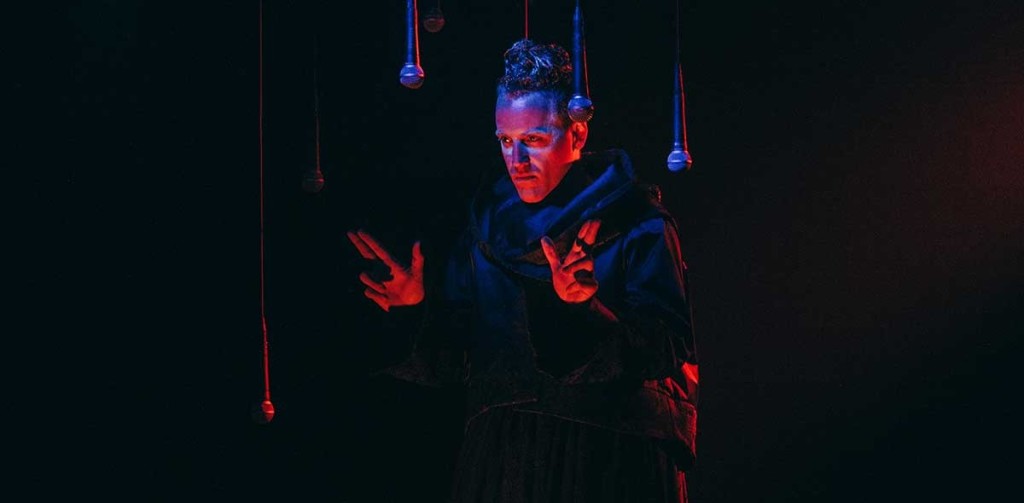Review by Sarah Higgins
As the inaugural show in the Club PuSH, The PuSH International Performing Arts Festival presented Stewart Legere and The Accidental Mechanics Company’s Let’s Not Beat Each Other To Death. This one man, multi-genre performance, written and acted by Legere, honours the stories of queer people across the world who have suffered violence for being who they are. It was a story in three acts: character monologues, memorial, and dance party. From the beginning the fourth wall was quickly dismantled, creating an open space for the audience to have a shared this experience of loss, anger, sorrow and, ultimately, love.
Act I was the most theatrical. Several characters, all played by Legere, took the stage. Death spoke candidly and colloquially as a throughline for the Act, interspersed with the stories of several queer victims of violence, including gay men from Halifax and a young lesbian from Ireland—all sensitively embodied by Legere. And with each new story Legere repeated, “It goes like this. It goes like this every time.”
Act I’s soundscape occasionally overwhelmed the actions onstage. Sometimes when the story called for quiet the soundscape kept on, which made the sound feel incongruous with the story it was meant to support. Act I also introduced defined, particular movements used to underscore the words. One especially poignant movement was Legere turning his face away from the audience when he began to act as Raymond Taavel, the queer activist beaten to death in Halifax in 2012; Legere’s inspiration for the performance.
For me, the full impact of Raymond’s story was felt in Act II, when Legere simply and powerfully acknowledged who he was, how he came to these stories, and why he has chosen to tell them. The deeply personal connection that Legere felt with Raymond’s story, and with all those he chose to tell, was reflected in the intimacy he shared with the audience. He invited us to physically gather close as he spoke from the heart about violence against queer people, how his sorrow turned to anger and hate and how eventually he was so broken by the violence of his own reactions that he had to rebuild. You could hear it all in his voice—the anger, the hate, the sorrow, the love. And you could hear it reflected in the quiet crying of the audience, the caught breaths, the shared gasps as each person added their own reaction, a piece of their own story, to the space. Act II was a reminder that the world is full of love and shit. That people are violent and kind, loving and hateful. It sent this message home with very powerful images projected while Legere spoke and sung his “eulogy for everyone”—stark photos of violence against queer people echoing the pain in his song, balanced by its love.
Act III was the called “Shake It Off”. Using dance as a reaction to trauma, as an expression of love and as a way for the audience to take the story with them, Legere opened the floor up, inviting everyone to join the show-turned-dance-party. Then he left the stage to join us on the dance floor as people moved the chairs aside and dimmed the lights and the DJ began to play. It was an organic movement from performance to invitation, and although the party may have been slow to pick up, those that were dancing were dancing with love.
The communal space that this piece created, and the essential humanity that Legere laid bare on stage, are two of the show’s greatest strengths. Because while these stories repeat, and while it goes like this every time, at least that means every time there is also love.
Let’s Not Beat Each Other To Death ran at Club PuSH on January 21 at the Fox Cabaret.
Sarah Higgins is into her second year of her Creative Writing Masters of Fine Arts at UBC. She’s foremost a playwright, and has had work produced at both edges of the country—from Little Mountain Lion Productions in Vancouver to a recent show in the Halifax Fringe festival.
